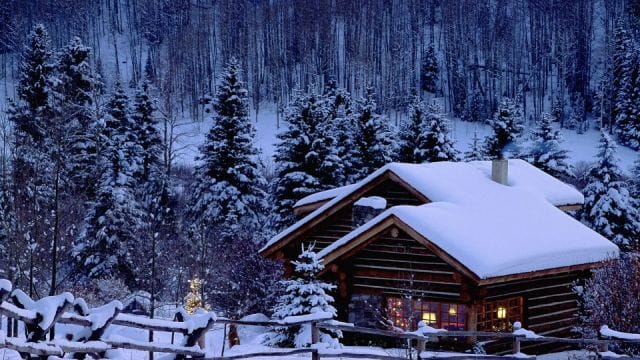Episodes: The fake Christmas Americans celebrate

Jaime Weinman has a strong piece today about how many of our Christmas songs take place in a version of the 1890s that the songwriters who created those songs had no first-hand experience with, to say nothing for those of us who sing or listen to those songs now. Something like "Winter Wonderland," for instance, seems to take place in one of those Twilight Zone episodes where a guy longs for a simpler life and ends up living in 1872 Connecticut or something -- only it turns out he was dead all along! They're songs about an imagined America we don't really live in anymore.
Jaime points out that there are a few songs about Christmas in the city ("Silver Bells," for instance, and "It's Beginning to Look a Lot Like Christmas"), but for the most part, these songs take place in a snowy wonderland that's increasingly a figment of the imagination, thanks both to the increasing urbanization of America and the fact that many of us live in areas that don't get snow at any point, much less in December. (Of course, something like "White Christmas" is deliberately written from the point of view of someone who lives within this homesickness.)
This is kind of an interesting conundrum, too. For the most part, American pop culture is malleable but always marching forward. We might do period pieces, but they become inextricable from the era in which they're made. (Take, for instance, the recent In the Heart of the Sea, which seems like a bunch of 2015 dudes who've had workplace sensitivity training have been dropped into the 1800s.)
But if you're someone recording a Christmas album, you're going to try to coin a few new classics, perhaps, but you'll mostly record the standards. Maybe a hymn or two, maybe a song about Santa Claus, and then a bunch of seasonal standards that are more about "winter" than anything else.
The reasoning for this is sound. It's incredibly hard to make a new Christmas classic. Mariah Carey's "All I Want for Christmas Is You" is the last to make it into the canon, and it's 20 years old. (From a Christian contemporary point of view, I think "Mary Did You Know" is probably in the Christmas canon, but it hasn't crossed into the mainstream. It's strictly a Christian audience thing.) And, yes, the old standards are strong songs, syrupy though they may be, but they're half-remembered recollections of something that's become even more distorted by time. They're things we sort of half-sing every year, never stopping to think about who, say, Parson Brown might be within the "Winter Wonderland" cosmos. (I like to imagine all Christmas songs share the same fictional universe and will get their own Avengers-style crossover.)
Jaime suggests this is because Christmas is a time for nostalgia and, thus, these songs can coast off an unfounded series of reminisces. That's probably true as it goes, but I'd tack on the notion that Americans are sort of uniquely obsessed with the idea that we might suddenly become an agrarian nation again, and Christmas -- a time for looking back over your life, if ever there was one -- becomes an excuse to cast back for previous versions of the country that are buried in our national DNA.
The Christmas of these songs, after all, is a perfect world, one where snowflakes fall in gorgeous symmetry, and the snow isn't a nasty impediment to travel but, rather, a chance to spend some time with those you love. It's the golden glow we all HOPE Christmas will be, and yet it's also, say, the thing that the uptight mom in the holiday movie is aiming for before she lets go and accepts that just having her children together is Good Enough for Her.
We're all looking for simplicity, I think, and there could be nothing more simple, more rustic, than a snowy field and an enchanting farm and a sleigh ride. (As someone who grew up in South Dakota, these songs perhaps cause deeper pangs for me than they do for many others.) The reality, of course, is that living in that place would be a lot of hard work. We know that, on some level, so many of these songs are about just visiting. But they're a necessary part of the ritual, even if I might long for songs that capture the messy world of Christmas as it is for most of us, a frantic race to a finish line that arrives all at once and deposits us in a place that seems, in retrospect, inevitable.
--
Episodes is published daily, Monday through Friday, unless I don't feel like it. It is mostly about television, except when it's not. Suggest topics for future installments via email or on Twitter. Read more of my work at Vox Dot Com.



